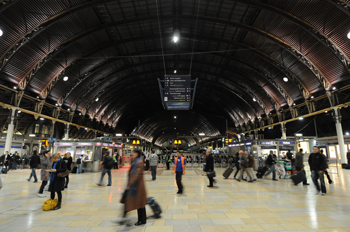Rail firms have sent out mixed messages ahead of three days of strike action, with some advising passengers to only travel only if absolutely necessary on strike days and others also applying the advice to days after the 24-hour walkouts.
Timetables will be published for each strike day – Saturday (5 November), Monday (7 November) and Wednesday (9 November).

Paddington station. Image: RDG
The Rail Delivery Group (RDG) said it is working hard to keep a limited number of trains running on strike days, with thousands of specially trained and fully qualified back-up staff stepping in.
However, it warned that only around 20% of services will operate and that some parts of the country will have ‘little or no rail services’ (sic). It said passengers should ‘only travel by train if it is absolutely necessary, allow extra time and check when their first and last train will depart’.
The RDG also warned that there is likely to be some disruption in the early morning of the day after each strike.
The RMT union said members working for Network Rail will strike on all three days while members working for 14 train operating companies will walkout on Saturday and Wednesday.
Staff working for Great Western Railway (GWR), Avanti West Coast, South Western Railway (SWR), Chiltern Railways, Cross Country Trains, Greater Anglia, LNER, East Midlands Railway, c2c, Northern Trains, South Eastern, Transpennine Express, West Midlands Trains and GTR (including Gatwick Express), will walk out.
Other rail trade unions – TSSA and Unite – are also striking at points over the period, as well as action short of a strike on six operators.
SWR said passengers should only travel by rail if absolutely necessary from Saturday to Thursday, while Chiltern said passengers should ‘only travel if essential’ on Sunday.
However, other operators such as GTR, SouthEastern, Northern and GWR only gave this advice in relation to strike days.
Despite inflation currently running at over 10%, Network Rail’s chief executive, Andrew Haines, who earns nearly £600,000 a year, described its offer of an 8% rise over two years as ‘fair and affordable’.
Register now for full access
Register just once to get unrestricted, real-time coverage of the issues and challenges facing UK transport and highways engineers.
Full website content includes the latest news, exclusive commentary from leading industry figures and detailed topical analysis of the highways, transportation, environment and place-shaping sectors.
Use the link below to register your details for full, free access.
Already a registered? Login